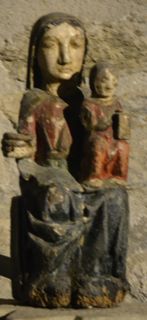Umpf, another hard hit by Jacques Le Goff. He describes ‘the cheaply repeating of fashionable nonsense about the decadency of the current time in contrast to the gloryful, fresh and pietfull past.’ Of course, when I am thinking about writing ‘In search of austerity’ this is the trap that is wide open for me. The hit was hard, but I saw it coming and have been prepared. He missed and I hit back. ‘ ‘There must be truth in something that is considered true through all times.
But seriously, I agree with Le Goff. There must be a lovely book in trying to find examples of people glorifying the past through the ages. By necessity they would start to compare to times that have been considered unfavourable to some glorious past before. I’ll write that book after the signs book.
I am really starting to enjoy Le Goff. He gave me this new idea about the division between North and South of Europe. The restricted North compared to the abundant South. Traditionally the explanation for this is the division between careless catholicism and prudent protestantism.
But the division might be older. Le Goff describes two distinct ideologies behind the monasteries that were established in Europe in the early Middle Ages. There were the ones that followed Benedict (Italian) and his Rule. And then there were the ones that followed the Irish Colomban (never heard of him before.
The Rule of Benedict was full of concern for weaker people, relatively human and not strict in the way a medieval person would define the word. It was all about moderation, the old Stoic belief of ancient times (Seneca). According to Le Goff Moderation got a Christian face through Benedict.
Colomban was much more strict. This was austerity to serious extremes. One meal a day, no meat, no exceptions. Those kind of things.
Benedict was successful in Italy, France and Spain. Monasteries in his name sprouted everywhere. The Irish went to Holland (although there was no official Holland at the time) and Germany (ditto) and established their own interpretation of true religion.
Even more interesting: They bypassed England. The Irish hated the English even at the time. They didn’t want to go and Christianize them. That would cause them to meet the English in heaven, something the wanted to prevent at all costs. The english were Christianized then by Benedictine monks, which explains their ridiculously high budget deficit and the fact they had to be saved recently (historically spoken) by the IMF.
All could clearly have been predicted if one knew the lessons of history.
Another lovely Le Goff insight. He talks about time. It wasn’t very important, time, in the middle ages. Time was being dictated by the rhythm of the land, which sounds lovely. All saints day was originally on the 13th of may, but this being too being too busy of a time for farmers was replaced to the 1st of november. Delightful flexibility.
Le Goff also writes about the development of our current calendar. Why did the year not start with the birth of Christ. That would make sense if you call the years before and after Christ, not? Or why not in march, that would make september the 7th month, october the 8th, november 9th and december 10th. Which would make sense. Or at Easter, which was really the favourite of many Christians – then it is really after Christ (but of course, he came back and is still there somehow, supposedly – there ís no after Christ!).
Anyway, the chose for the 1st of january, the day of Christ’s circumcision. No explanation by Le Goff, but knowing this I would have hoped they would have chosen the 25th of december. Much less bloody.
The relic of the foreskin of Jesus used to be in Reading, close to where we lived in England. It got lost somehow after the reformation and the burning down of the abbey of Reading. No worries, in Istanbul is still a good bottle of real Christ blood. Cloning science is working on it!
Reading Le Goff is a gift that keeps on giving. ‘A will is a passport to heaven’, for example. In their wills rich people left a whole lot of land and other valuables to the church. Purgatory, Jesus on the cross, Mary and boy, they are all inventions of the Middle Ages, more specifically of the period we are travelling trough. But then; ‘Christianity was still only a little layer of varnish over a dominantly old fashioned farmers culture.’
Applause, the fight is over. Jacques has won me over.



Han says
Now I understand a lot better why feeling so miserable at new year’s day …
Mary says
I love this statue